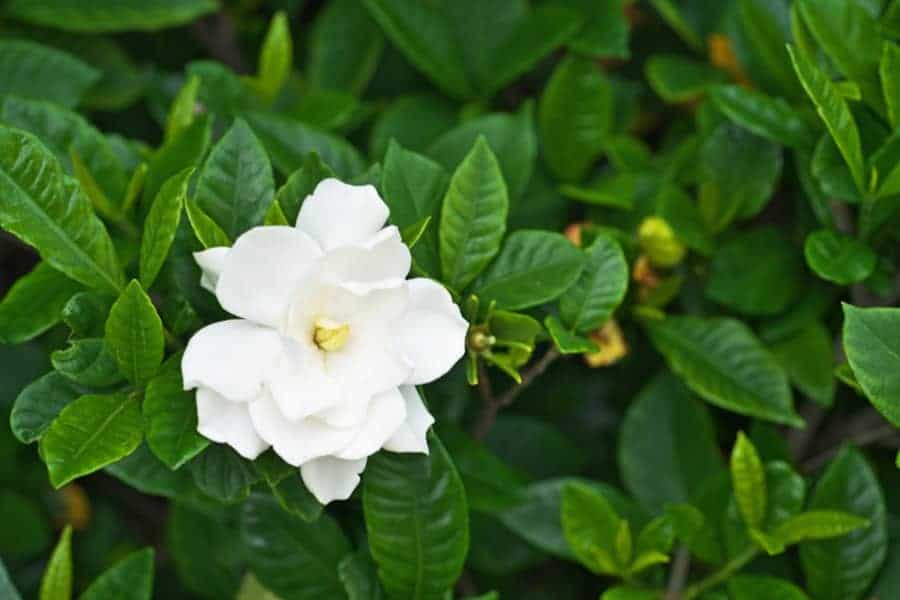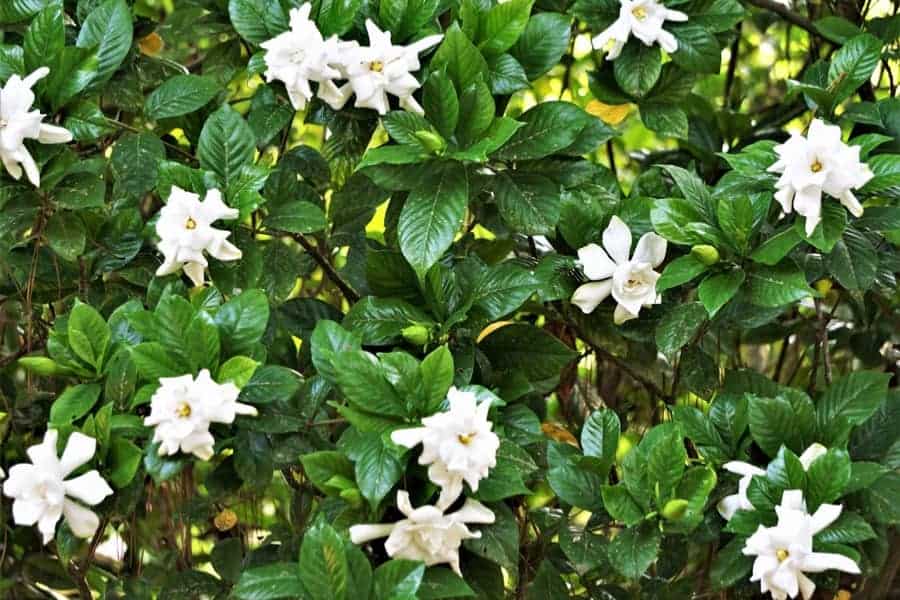
It’s not an easy job to maintain a garden in deer-infested areas. Many people prefer to cultivate Gardenias as a preventive measure to keep deers from ruining the plants. But the question is, are Gardenias really effective as deer-resistant shrubs?
The truth is, deer don’t eat Gardenias as it’s not a desirable meal for them. However, in cases of extreme food scarcity due to overpopulation, you may even find deer feeding on Gardenias. There are no plants that are 100% deer-resistant.
If you aren’t satisfied with the above answer and are wondering if there are any ways to entirely deer-proof a garden, keep reading. Below is a brief overview explaining the property that makes certain plants and flowers deer-tolerant. And how you can incorporate it with other methods to prevent deer from browsing your garden.
Do Deer Eat Gardenias?
Gardenias are evergreen shrubs known for aromatic white flowers and dark-green leaves. Many gardeners plant Gardenia primarily for its pleasant fragrance and to enhance their yard’s aesthetic appeal.
Besides, Gardenias are widely used deer-resistant shrubs. Deer don’t typically eat it and stay away due to the plant’s strong scent. Only times deer will browse on Gardenias when there is food scarcity.
It often happens when deers have overpopulated the area, and there aren’t many food choices available. In such circumstances, they will even eat the plant’s considered deer resistant. A starving deer don’t care about food preference. They quickly adapt to the situation and feast on the plant matter that they don’t usually eat.
So does that mean Gardenias can’t keep the deer away? Absolutely not. Gardenia is an effective deer-resistant shrub that works amazingly under normal circumstances. To get the best out of it:
- You can plant Gardenias as hedges and grow the delicate cultivars internally.
- If you cultivate certain plants or flowers deer are primarily attracted to, try planting Gardenias next to them. It will save your plants from getting eaten.
The Truth About Deer Resistant Plants and Flowers
Do you know what makes certain plants, shrubs, or flowers deer resistant? The pungent aromas of plants act as a natural repellent to the deer. They will prefer to pass on any plants with fuzzy foliage and those that taste like lemon, mint, or sage.
In a nutshell, to keep deer away from your yard, start cultivating more strong-scented plants.
Holly, Japanese Kerria, Juniper, Barberry, Blue Mist, and Boxwood are some deer-resistance shrubs you can start experimenting with. When you have a garden consisting of plants that deer don’t usually eat, they will have no desire to be around. Eventually, you will see deer have stopped intruding into your garden, allowing you to take a sigh of relief.
How to Prevent Deer From Eating Gardenias?

Deer may become a nuisance at times when food becomes scarce in the area, and they will start nibbling on plants once considered to be deer resistant. Even though, Gardenia is not a desirable meal for deer to feed on. A starving deer, desperately looking to fill its stomach, will eat it anyway.
In those situations, you can resort to taking additional measures to ensure a deer-proof gardening area.
Erect a Fence
Enclosing the garden using a deer fence is one of the most effective ways to keep your plants intact. A fence works as a barrier that creates a sort of resistance for deer to walk in, keeping them away from the area.
Black mesh deer netting is a widely used fencing type. It’s economical and readily available. Black netting works as an invisible deer fencing as deer have trouble seeing the black color. Keep the fence height to 8-10 feet tall to keep deer from jumping it.
Spray Deer Repellent
Another way to prevent deer from browsing is to spray your plants with commercial deer repellent. These products contain the smell that deer dislike or are petrified of.
It may include the smell of putrescent egg solids, marigolds, mint, wolf urine, tansy, garlic, thyme, oregano, sage, rosemary, or lavender. It’s been reported that eggs-based products are most effective. Deer Away, Bobbex, and Liquid Fence are some of the popular deer repellent products you can buy.
You can also make homemade deer repellent spray using eggs, garlic, and chili peppers. The putrid fragrance of the mixture will keep the deer from coming close to plants or eating them.
Auditory Deterrents
Deer have large ears and highly sensitive hearing. Any unexpected or unusual sound can startle them, even if it’s not too loud. Using this trait to our advantage, we can employ noisemakers like gas or propane exploders, whistles, and ultrasonic devices to keep deer away from our yard. Pie pans and aluminum cans are also effective auditory deterrents for deer.
The unexpected loud banging noise often terrifies the deer as they suspect it to be a potential danger. However, using the same sound repeatedly will make it easy for them to realize the pattern, and they will no longer get scared. It’s crucial to have some variation.
Use Motion Sensor Sprinkler
If you are against using chemical repellent, go for motion-activated sprinklers to frighten deer away. Our aim is not to hurt the animal but to scare them so they won’t ruin the plants we have worked hard to cultivate.
These sprinklers come with an intelligent sensing technology that activates water spray when there is motion around. Orbit 62100 Yard Enforcer is probably the best motion-sensing sprinkler out there. It works day and night, keeping your garden protected 24 hours by spooking away deer using water spray.
Plant Strategically
If you reside in an area where deer has almost become a pest for gardens, you must plant strategically. It includes growing pungent perennials as a natural barrier and keeping deer favorite plants close to the house.
Cultivating ornamental plants that deer don’t like much is perhaps the most natural way to keep them off your garden.
Frequently Asked Question
Q. What are the best deer-resistant plants to grow in a garden?
Deer usually dislike plants with a strong fragrance and aroma. Some common deer-resistant flowers (annual) are signet marigold, verbena, snapdragon, daffodils, foxgloves, and poppies. Herbs such as sages, ornamental salvias, and lavender can also be used for keeping deer away.
Q. What to do when deer-resistant plants are being eaten?
Deer nibbling plants they are supposed to run from indicates a food shortage. In such conditions, you can install a fence around your garden, spray deer repellent, use auditory deterrents or motion sensor sprinklers.
Final Words
If deer have become a serious problem for you, try making your garden as deer-resistant as possible. Gardenias are certainly going to repel deer from the intense aroma they give off.
To ensure a deer-proof garden, use other methods mentioned above. It will ensure that your garden plants remain intact.
